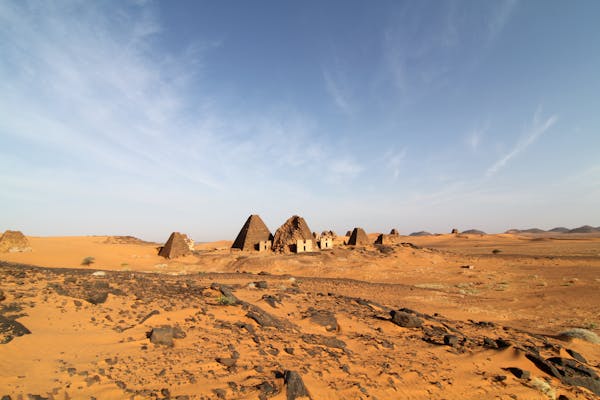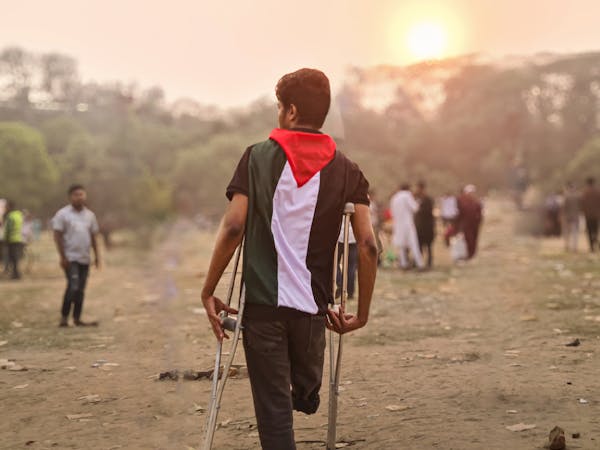It’s a strange feeling to sit in a quiet room in London, watching diplomats in suits gather under grand chandeliers, sipping coffee and speaking in carefully measured tones, while half a world away, children in Sudan are digging through rubble with their bare hands.
On April 15th, 2025, London hosted a peace conference meant to mark a turning point. A gesture of hope, perhaps — an attempt by world powers to confront the spiraling nightmare that has engulfed Sudan for the past two years. But for many of us watching from the outside — especially those with roots in the region or who’ve followed the crisis closely — it didn’t feel like hope. It felt like déjà vu. Another room full of powerful people speaking carefully worded truths, while the ground continues to burn.
Sudan has now entered its third year of brutal civil war, and there are no signs that the fighting is easing. The Rapid Support Forces (RSF) and the Sudanese Armed Forces (SAF) have ripped the country apart, piece by piece. Millions have been displaced. Cities that once stood tall now lie in ruins. And all of it — all of it — has unfolded largely outside the world’s gaze.
But this week, the world finally looked again. Whether it will act is another matter.
A Conference of Intentions, But Few Commitments
The London conference was supposed to do two things: draw attention to the humanitarian catastrophe in Sudan, and spark momentum for a political resolution to the war. Co-chaired by the United Kingdom, the European Union, France, Germany, and the African Union, it pulled together over 20 nations and major institutions, including the US, Egypt, Saudi Arabia, and the UAE.
There were pledges. The UK promised £120 million in aid. The EU committed fresh funding. Speeches were made. Heads nodded. And yet, for all the talk, the conference ended with a grim undertone: no joint agreement, no unified roadmap toward peace. The key players — especially Egypt, Saudi Arabia, and the UAE — couldn’t align on a plan. That fracture was impossible to ignore.
Some wanted to press forward toward civilian-led governance. Others demanded the fighting stop first before talking about politics. And still others, perhaps, weren’t ready to make any commitments at all.
Sudan Burns, Quietly
What’s staggering about Sudan is not just the scale of the tragedy, but the silence surrounding it. In a world where every major conflict usually comes with media saturation, hashtags, and wall-to-wall coverage, Sudan has been left to suffer mostly in the shadows.
Right now, over 25 million people need humanitarian assistance. That’s more than half the country. At least 14 million are displaced, either internally or as refugees in neighboring states. The health system has all but collapsed. Famine looms. Schools are shut. Power grids are down.
Hospitals have been bombed. Doctors killed. Civilians shot in the streets or dragged from their homes. Rape and sexual violence are widespread, used as tools of war. Markets have been torched. Aid convoys hijacked.
And the saddest part? None of this is new. It’s just the latest chapter in Sudan’s long, heartbreaking story — a story that’s seen too many false starts, broken promises, and forgotten people.
Missing From the Table: Sudan Itself
Perhaps the most jarring detail from the London conference was this: neither the SAF nor the RSF were invited. The two warring factions — the ones holding Sudan hostage — weren’t in the room. It’s like trying to put out a fire without speaking to the arsonists.
Sudan’s foreign minister, who still claims legitimacy despite the chaos, criticized the decision. He said peace can’t happen without dialogue — real, gritty, face-to-face engagement with the actors fueling this war. And he’s right. You can’t mediate a conflict by ignoring the people with guns. But inviting them, of course, would come with its own complications — moral and diplomatic.
It’s the classic conundrum: talk to warlords, or exclude them and risk irrelevance?
The Shadow of Foreign Influence
Sudan’s civil war isn’t just a domestic collapse. It’s become a regional chessboard — a proxy conflict with players who have deep pockets and sharp agendas. The UAE has been accused of backing the RSF with weapons and funding. Egypt is seen as sympathetic to the SAF. Saudi Arabia plays a quieter, more measured role, but its influence is unmistakable.
These rivalries — rooted in decades of power struggles in the Horn of Africa and beyond — are making any unified international response incredibly difficult. Everyone wants to shape Sudan’s future. Few want to compromise. And almost no one wants to admit their role in making things worse.
The London conference brought these tensions into sharp focus. Without harmony among the Arab powers — especially the Gulf states — any path forward risks collapse.
Money Pledged, But Will It Reach the People?
Aid was a centerpiece of the conference. And rightly so. People in Sudan are starving. Families have gone days without food. Clinics lack basic supplies. Clean water is a luxury. So the financial pledges — over $2 billion in total — were welcome.
But pledges are not guarantees. And even if the money comes through, there are major questions about how aid will be delivered. Most NGOs have pulled out. The UN has limited access. And the warring sides have routinely blocked or looted aid convoys. In some areas, RSF fighters have used food as a bargaining chip. In others, the SAF has refused to allow foreign groups to operate.
It’s a humanitarian minefield. And the victims — as always — are the ordinary Sudanese people caught in the middle.
The Deafening Global Indifference
One of the hardest things to confront, writing this, is the simple truth that many people don’t know or care about Sudan. I don’t say that judgmentally. There’s so much pain in the world right now. Ukraine, Gaza, Yemen, Syria. The climate crisis. Inflation. Politics. Everyone’s overwhelmed. But Sudan has always seemed to be the tragedy that gets ignored first.
Maybe it’s because the conflict feels too complex. Maybe it’s because there’s no easy hero-villain narrative. Maybe it’s because the people dying don’t look like us, don’t live like us, don’t speak our languages. But whatever the reason — it’s wrong. Sudanese lives are no less valuable. Their suffering is no less real.
And it’s not just about morals. If Sudan collapses completely, the consequences will be felt far beyond Africa. Refugee flows. Regional instability. Radicalization. We’ve seen this story before — in Libya, in Syria. The world ignores broken countries at its peril.
Hope is Fragile — But Not Dead
It’s easy to fall into despair when you look at Sudan. But even now, there are glimmers of something else — resilience, resistance, refusal to be erased.
Sudanese civil society, battered and scattered, is still speaking out. In refugee camps, people are organizing makeshift schools. In diaspora communities, young Sudanese are raising money, sharing stories, demanding accountability. On social media, survivors are posting photos, videos, names. Keeping memory alive.
They deserve more than just our pity. They deserve solidarity, support, and pressure — pressure on governments, donors, and institutions to do more than just hold conferences and issue press releases.
So What Now?
London’s conference wasn’t a failure — but it also wasn’t the breakthrough Sudan needs. It was a signal, a gathering of concerned voices. But concern alone won’t end a war.
The path forward has to involve:
Direct engagement with both the RSF and SAF — ugly as that may be.
Accountability for war crimes and abuses, from all sides.
Humanitarian access — unimpeded, non-politicized, massive in scale.
Inclusive dialogue with civil society, not just armed factions.
Pressure on regional powers to stop fueling the fire and start backing peace.
That’s a tall order. But the alternative — more years of bloodshed, more children buried under rubble — is unthinkable.
The People Deserve Better
At the end of the day, peace in Sudan isn’t going to come from a palace in London or a ballroom in Riyadh. It’s going to come from the Sudanese people — when they are finally given the space, the tools, and the support to rebuild their country on their own terms.
Until then, we watch, we write, we scream into the void. And we hope — not blindly, not passively — but with purpose.



